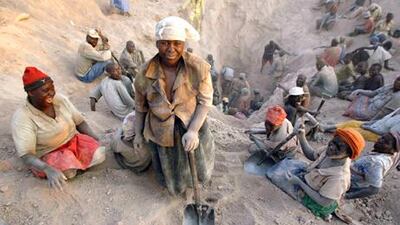It may sparkle like nothing else on Earth, and symbolise the most important choices you've ever made - but could the diamond on your finger have fuelled war and oppression?
These beautiful gemstones returned to the news this winter, when the natural-resource monitors Global Witness issued a warning about the processes designed to keep corrupt diamonds off the market. Often called "blood diamonds" due to their use as a funding source for fighting groups, these tainted stones have supposedly been kept away from reputable dealers through a 2003 monitoring agreement.
Now, however, Global Witness says it has lost faith in the ability of this agreement - called the Kimberley Process Certification Scheme - to keep the market clean. It alleges that among conflict-free gems, diamonds currently filtering into shops may now come from such human rights trouble spots as Zimbabwe's Marange Region.
So have diamonds become an unethical purchase once more? Or are there still ways to make sure your rocks are clean?
While the Kimberley Process was hailed as a huge step forward when it was introduced nine years ago, some groups now feel it is not working. According to Global Witness, it has allowed breaches of its rules to go unchecked in Cote d'Ivoire, Venezuela and Zimbabwe, where diamonds from the Marange region are one of the Robert Mugabe government's last source of international revenue.
As the Global Witness director, Charmian Gooch said in a press release:"Over the last decade, elections in Zimbabwe have been associated with the brutal intimidation of voters. Orchestrating this kind of violence costs a lot of money. As the country approaches another election, there is a very high risk of Zanu PF hardliners employing these tactics once more and using Marange diamonds to foot the bill. The Kimberley Process's refusal to confront this reality is an outrage."
Global Witness's stance is nonetheless not unanimous. Some diamond trade groups claim that the NGO's rejection of the Kimberley Process might make the situation worse, undermining the one tool they have to keep the diamond market clean.
As Caroline De Wolf, a spokesperson for the Antwerp World Diamond Centre says: "We all need to work together to keep the Kimberley Process alive and we will always support it. It's sad and regrettable that Global Witness has withdrawn, but other NGOs in the same area who could also step out have chosen not to. I would also say quite clearly that no conflict diamonds are entering [world diamond trade centre] Antwerp - we open and inspect every single package."
But while Global Witness has criticised current conditions, it is not suggesting a boycott per se. As Global Witness's Annie Dunnebacke says: "We actually want to be able to buy African diamonds. The problem is that, currently, there simply isn't a way for consumers to be sure if their diamonds are conflict-free - that is precisely the problem Global Witness is highlighting. People are looking for some good news on this, but the problems simply can't be glossed over."
So what can the everyday buyer do in such a confusing situation? It seems hard to stop buying entirely from an industry in which so much of the production is legitimate. At the same time, if there is no proper scrutiny from the public there, retailers themselves will never start asking difficult questions about how the diamonds they buy can be proven to be conflict-free. When The National contacted several jewellery dealers in Abu Dhabi, all of them only seemed aware of diamond certificates governing quality - how good the gems are - not provenance, or where they come from. This doesn't mean their gems aren't legitimate - the difficulty of tracing gems origins after they have been polished is one of the issues Global Witness focuses on. It does suggest, however, that none of these retailers was at all used to questions from the public challenging the origins of the diamonds they sell. Dunnebacke suggests that demanding clear answers from jewellers on this subject is a useful first step in blocking funds to repressive regimes such as Mugabe's.
"If retailers hear from their customers that they want change, they will do so. I would recommend customers to ask tough questions, to ask what retailers' policies are. If they assure them they are not buying a blood diamond, they need to press to see exactly how they are backing up this claim. Some retailers are completely indifferent to the sources of their diamonds, while others are really trying to make an effort, so it's worth shopping around and finding out which retailers have the highest standards.
"If everyone buying a diamond this month said 'I don't want a diamond from Zimbabwe' the situation in the industry would change very quickly."
Follow us on Twitter and keep up to date with the latest in arts and lifestyle news at twitter.com/LifeNationalUAE

